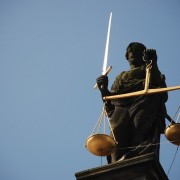TECHNOLOGY MEETS THE CONSTITUTION
Continual advances in technology have been a never-ending source of frustration and challenge for the courts who must interpret laws that were written during a time that preceded automobiles, electricity, telephones, and the Internet. As a result, judges try to apply laws, such as the Fourth Amendment of the United States Constitution, to the intended meaning of our founding fathers. In recent weeks, the United State Supreme Court justices were left to determine whether a Global-Positioning-System (GPS) tracking device mounted on a suspect’s car and continuously monitored for twenty-eight days violated the Fourth Amendment (establishing the right against unlawful search and seizure). This case, United V. Jones, is a prime example of a quandary that statesman of the late-18th century would have never begun to conceive when drafting the contents of the Constitution. Rather, their contemporary scope of private property and privacy were limited to within one’s home and chattel.
The arrival of smart phones, GPS tracking, and powerful computers has changed the definition of privacy. In a time when a smart phone can store vast amounts of personal information, GPS devices can pinpoint a user’s location within seconds, and computers can store information on every website visited, the user is left to ask: “Who is really benefiting from the easy access and wealth of this information?”
The line between privacy and the interest of public safety can be thin. In the interest of maintaining public safety, the goodwill efforts of law enforcement can quickly turn into an abusive over-reaching power that encroaches on the privacy of the individual. Furthermore, the limited privacy protections that equip many of the most popular technologies, such as the smartphone, provide the user with few capabilities to protect his store of information and avoid possible incrimination if he were to be searched by the police.
In an article published in The Champion (a publication by the National Association of Criminal Defense Lawyers), author Adam M. Gershowitz reviews the case law history and surmises how modern technologies, such as the smartphone, will be treated by the law in “Can Police Search Your Cell Phone, and Even Break your Password, During an Arrest?” Gershowitz’s primary analysis focuses on the narrow window when a police officer may search an arrestee’s person and immediate vicinity upon an arrest, also known as Incident to Arrest Doctrine. This doctrine was established to legally allow law enforcement to perform searches for physically harmful instruments, such as weapons, for the purpose of personal protection. Any incriminating evidence obtained during the search may be confiscated and used against the arrestee.
Cell phones, which are commonly located on the person’s being are, in essence, classified as a container, and therefore, acceptable for search (United States v. Chan, 803 F. Supp. 531 (N.D.Cal. 1993)). Therefore, even though its contents are that of electronic information rather than a tangible (or possibly harmful) object, the police have the authority to search the “electronic container.” Now that electronics, such as cell phones, can be password protected, the author poses the question whether law enforcement has the right to demand passwords from the arrestee. If the arrestee knows that the cell phone contains incriminating evidence, is law enforcement violating the Fifth Amendment (the right not to incriminate oneself) in the search for evidence?
In the recently decided case United States v. Jones, the Supreme Court determined that Global-Positioning-System (GPS) tracking violated the defendant’s Fourth Amendment rights. When rendering the opinion, the justices unanimously ruled that Jones’s rights had been violated; however, the court’s the ruling was split. The majority, Justices Scalia, Roberts, Kennedy, Thomas, and Sotomayor, reasoned that the attachment of the GPS unit on the respondent’s vehicle was a physical intrusion by the government, therefore constituting as a search. Differing in opinion and comprising the minority, Justice Alito expressed the concern that long-term GPS monitoring “impinges on expectations of privacy.” The “expectation of privacy” principle is based on an interpretation of the Fourth Amendment in Katz v. United States, 389 U.S. 347 (1967). Alito goes on to quote Katz:
“. . . capacity to claim the protection for the Fourth Amendment depends not upon a property right in the invaded place but upon whether the person who claims the protection of the Amendment has a legitimate expectation of privacy in the invaded space. ”
Justices Ginsburg, Breyer, and Kagan concurred on this holding.
Revisiting the question whether police officers may demand passwords to cell phones (and whatever other electronic devices that are discovered in a search), if the device is password protected, is it not reasonable to assume that the owner took such measures to ensure privacy?
In an age where easy access to information is demanded, and only a thin veneer of propriety ensures the safeguarding of that information, we must seek protection from abuses and invasion from established laws. Furthermore, we can only hope that the interpreters of such law will wisely translate 18th century writings and philosophy in an applicable format for today’s modern world.








Leave a Reply
Want to join the discussion?Feel free to contribute!